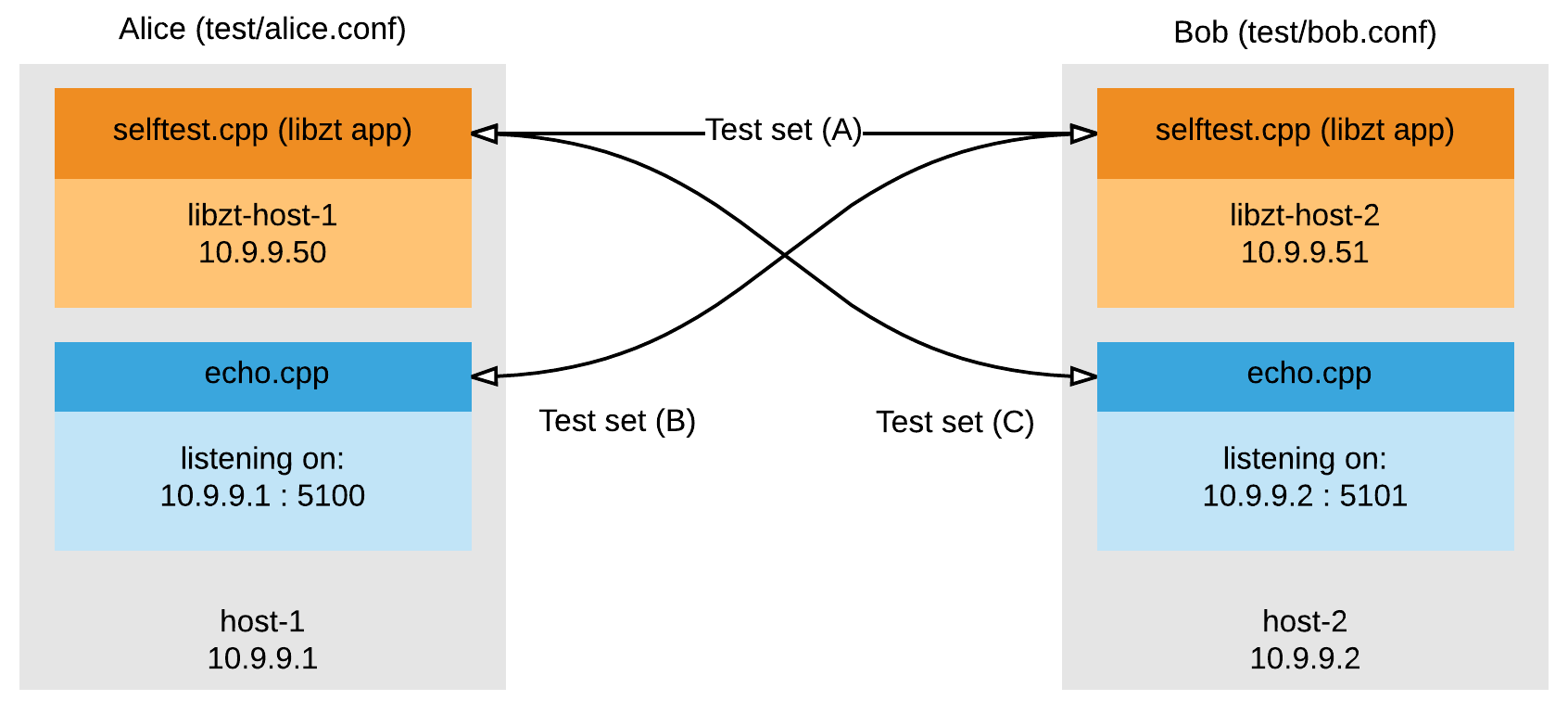Testing via selftest.cpp
make static_lib SDK_DEBUG=1: For debugging libztmake static_lib ZT_DEBUG=1: For debugging the ZeroTier core protocol (you usually won't need this)
make tests
This will output selftest and echotest to build/$PLATFORM/
Note, the following examples assume your testing environment is linux, you'll see this in the build output path. If this is not true, change it to darwin, freebsd, or win depending on what you're running.
This is essentially just a listing of libzt-based app identities and host machine identities. We will be conducting library-to-remote-library, library-to-remote-host, and remote-host-to-library tests over the network. For this reason we need to define who should be talking to who.
A simple test configutation might look like the following. This will create an alice and bob test personality, that is, we will run one instance of the library as a server (alice), and one instance of the echotest on the same host machine. echotest is merely a program to record timings for transmitted data and also generate data for the library to receive). Additionally we will be running a library as a client bob on another remote host as well as another instance of echotest on that same machine. In this configuration the following will happen:
alicelibzt will tx/rx to/fromboblibztalicelibzt will send X bytes tobob'sechotestto test maximum TX ratealicelibzt will request X bytes frombob'sechotestto test maximum RX rateboblibzt will send X bytes toalice'sechotestto test maximum TX rateboblibzt will request X bytes fromalice'sechotestto test maximum RX rate
# Tests will use ports starting from 'port' to 'port+n' where 'n' is the number of tests
# Alice
name alice
mode server
nwid 17d7094b2c2c7319
test comprehensive
port 7000
path test/alice
ipv4 172.30.30.10
ipv6 fd12:d719:4b6c:6c53:f799:13c4:07e0:abb8
echo_ipv4 172.30.30.1
echo_ipv6 fd11:d759:136e:2b53:6791:9328:31ce:618a
;
# Bob
name bob
mode client
nwid 17d7094b2c2c7319
test comprehensive
port 7000
path test/bob
ipv4 172.30.30.20
ipv6 fd11:d759:136e:2b53:6791:9328:31ce:618a
echo_ipv4 172.30.30.2
echo_ipv6 fd12:d719:4b6c:6c53:f799:13c4:07e0:abb8
Build outputs are as follows:
build
|
|--darwin
| |-libzt.a
| |-selftest
| |-echotest
|
|--linux
| |-libzt.a
| |-selftest
| |-echotest
|
|--freebsd
| |-libzt.a
| |-selftest
| |-echotest
|
|--win
|-libzt.a
|-selftest
|-echotest
The self test will be performed over the network in the following configuration (addresses and ports are subject to change depending on what you define in your test/*.conf files):

- Test set A: Tests for correctness, error handling, blocking behaviour, on-system performance, etc
- Test set B: Tests RX performance (from non-libzt app)
- Test set C: Tests TX performance (to non-libzt app)
- Simple tests merely test one aspect of the library. For instance, its role as an IPv4 server, or IPv6 client.
- Sustained tests will test the library's ability to support long-duration connections and data transfers.
- Slam tests will test the library's ability to handle many repeated API calls or repeated common sequences of API calls that a typical application may make. For instance, it will try to create as many sockets as possible, or try to create a socket, bind to an address, listen, and accept over and over. This is useful for detecting memory leaks and architectural limitations in the stack drivers.
- A comprehensive test will test each aspect of the library one time.
- Makes random API calls with random (or plausible arguments/data) to test for proper error handling
- Test's the library's performance characteristics
- Tests's the library's error handling, address treatment, and blocking/non-blocking behaviour.